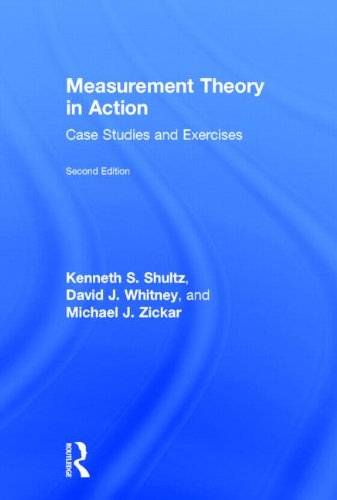

Most ebook files are in PDF format, so you can easily read them using various software such as Foxit Reader or directly on the Google Chrome browser.
Some ebook files are released by publishers in other formats such as .awz, .mobi, .epub, .fb2, etc. You may need to install specific software to read these formats on mobile/PC, such as Calibre.
Please read the tutorial at this link: https://ebookbell.com/faq
We offer FREE conversion to the popular formats you request; however, this may take some time. Therefore, right after payment, please email us, and we will try to provide the service as quickly as possible.
For some exceptional file formats or broken links (if any), please refrain from opening any disputes. Instead, email us first, and we will try to assist within a maximum of 6 hours.
EbookBell Team

5.0
18 reviewsThis book helps readers apply testing and measurement theories. Featuring 22 self-standing modules, instructors can pick and choose the ones that are most appropriate for their course. Each module features an overview of a measurement issue and a step-by-step application of that theory. Best practices provide recommendations for ensuring the appropriate application of the theory. Practical questions help students assess their understanding of the topic while the examples allow them to apply the material using real data. Two cases in each module depict typical dilemmas faced when applying measurement theory followed by Questions to Ponder to encourage critical examination of the issues noted in the cases. Each module contains exercises some of which require no computer access while others involve the use of SPSS to solve the problem. The book’s website houses the accompanying data sets and more. The book also features suggested readings, a glossary of the key terms, and a continuing exercise that incorporates many of the steps in the development of a measure of typical performance.
Updated throughout to reflect recent changes in the field, the new edition also features:
--A new co-author, Michael Zickar, who updated the advanced topics and added the new module on generalizability theory (Module 22).
-Expanded coverage of reliability (Modules 5 & 6) and exploratory and confirmatory factor analysis (Modules 18 & 19) to help readers interpret results presented in journal articles.
-Expanded Web Resources, Instructors will now find: suggested answers to the book’s questions and exercises; detailed worked solutions to the exercises; and PowerPoint slides. Students and instructors can access the SPSS data sets; additional exercises; the glossary; and website references that are helpful in understanding psychometric concepts.
Part 1 provides an introduction to measurement theory and specs for scaling and testing and a review of statistics. Part 2 then progresses through practical issues related to text reliability, validation, meta-analysis and bias. Part 3 reviews practical issues related to text construction such as the development of measures of maximal performance, CTT item analysis, test scoring, developing measures of typical performance, and issues related to response styles and guessing. The book concludes with advanced topics such as multiple regression, exploratory and confirmatory factor analysis, item response theory (IRT), IRT applications including computer adaptive testing and differential item functioning, and generalizability theory.
Ideal as a text for any psychometrics, testing and measurement, or multivariate statistics course taught in psychology, education, marketing and management, professional researchers in need of a quick refresher on applying measurement theory will also find this an invaluable reference.